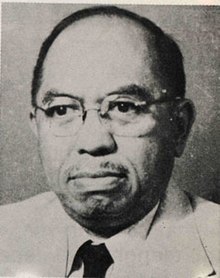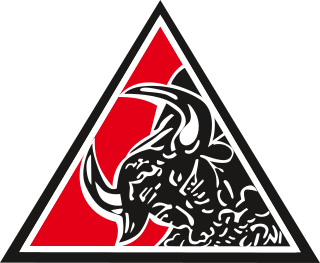
The Indonesian National Party was the name used by several nationalist political parties in Indonesia from 1927 until 1973. The first PNI was established by future President Sukarno. After independence, the new PNI supplied a number of prime ministers, and participated in the majority of cabinets in the 1950s and 1960s. The party was fused into the Indonesian Democratic Party in 1973. In the years following the reforms of the late 1990s, a number of parties claiming to be the continuation of previous PNIs stood in elections, but gained only a handful of seats.
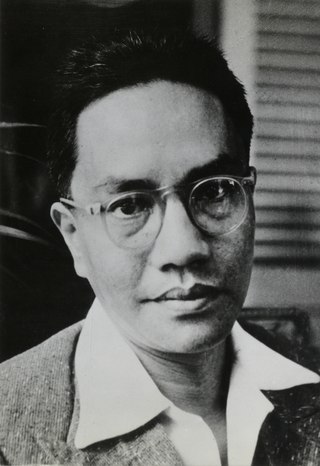
Amir Sjarifuddin Harahap was an Indonesian politician and journalist who served as the second prime minister of Indonesia from 1947 until 1948. A major leader of the left wing during the Indonesian National Revolution, he previously served as Minister of Information from 1945 until 1946 and Minister of Defense from 1945 until 1948. Amir was born into the Sumatran aristocracy and was educated at Leiden University. At Leiden, he became a member of the board of the Gymnasium student association in Haarlem and was involved in the Batak student organization Jong Batak. He returned to Indonesia due to family troubles but continued his education at the Rechts Hogeschool in Batavia.

Sjafruddin Prawiranegara was an Indonesian statesman and economist. He served in various roles during his career, including as head of government in the Emergency Government of the Republic of Indonesia, as Minister of Finance in several cabinets, and as the first Governor of Bank Indonesia. Sjafruddin later became the prime minister of the Revolutionary Government of the Republic of Indonesia, a shadow government set up in opposition to the country's central government.

The Central Indonesian National Committee, also known as the Central National Committee, was a body appointed to assist the president of the newly independent Indonesia. Originally purely advisory, it later gained assumed legislative functions. The Working Committee of the KNIP became part of the People's Representative Council when Indonesia became a unitary state in 1950.
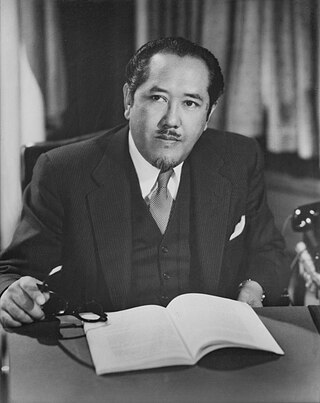
Ali Sastroamidjojo was an Indonesian politician and diplomat. He served in various political and diplomatic roles during the presidency of Sukarno, most notably as a cabinet minister, prime minister, chairman of the Indonesian National Party (PNI), and permanent representative to the United Nations. Ali was born in Grabag, Purworejo, Dutch East Indies, to an aristocratic family from Magelang and studied at Leiden University. During his studies, he was active in several youth organizations, including the Jong Java and the Perhimpoenan Indonesia associations. He was briefly arrested by the Dutch in 1927 but was released shortly thereafter.

The First Sjahrir Cabinet was the second Indonesian cabinet, named after the prime minister. It served from November 1945 to March 1946.

The Second Sjahrir Cabinet was the third Indonesian cabinet and the second formed by Sutan Sjahrir. It served from March to October 1946.

The Third Sjahrir Cabinet was the fourth Indonesian cabinet. It served from October 1946 to July 1947, when it fell due to disagreements related to the implementation of the Linggadjati Agreement and subsequent negotiations with the Dutch.

Soekiman Wirjosandjojo was an Indonesian politician and physician who served as prime minister of Indonesia from 1951 until 1952. Additionally, Soekiman served as the first president of the Masyumi Party from 1945 to 1951.
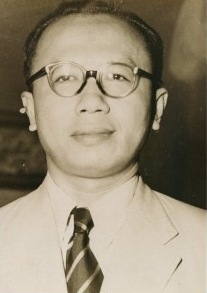
Djuanda Kartawidjaja, more commonly referred to mononymously as Djuanda, was an Indonesian politician and technocrat who held various positions during the presidency of Sukarno, most notably as prime minister of Indonesia and a cabinet minister in several cabinets.
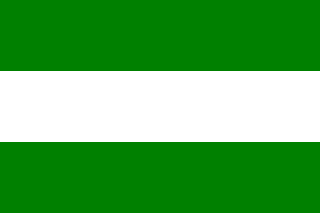
The State of Pasundan was a federal state (negara bagian) formed in the western part of the Indonesian island of Java by the Netherlands in 1948 following the Linggadjati Agreement. It was similar to the geographical area now encompassed by the current provinces of West Java, Banten and Jakarta.

Raden Panji Soeroso was a politician, Sarekat Islam activist, and a National Hero of Indonesia. He served as Governor of Central Java and Minister of Public Works and Manpower under the Great Indonesia Party. He was also a vice chairman of the BPUPK and a member of PPKI. He was the founder of the Civil Servants Cooperative Republic of Indonesia. Soeroso was born in Porong, Sidoarjo, East Java, Dutch East Indies. Soeroso was posthumously honored as an Indonesian National Hero through a Presidential Decree issued on October 23, 1986. He died in Indonesia.
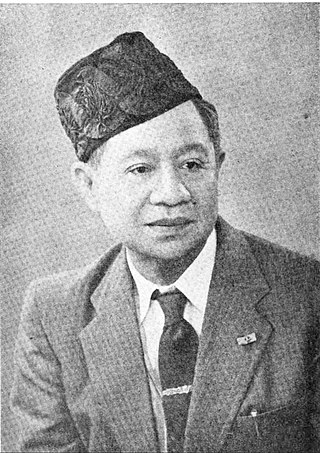
Wiranatakusumah V was an Indonesian noble and politician. He served as the first and only Wali Negara of Pasundan, during the Indonesian National Revolution. He also served as the first Minister of Home Affairs and the second chairman of the Supreme Advisory Council.

Alexander Andries Maramis, more commonly known simply as A. A. Maramis, was an Indonesian politician and National Hero of Indonesia, who was involved in the struggle for independence. He was a member of the Investigating Committee for Preparatory Work for Independence (BPUPK), the organization which drafted the Constitution of Indonesia. In the early stages of the Indonesian government, following the Proclamation of Independence, he served as both Minister of Finance and Minister of Foreign Affairs. After the end of the Indonesian National Revolution, he served as the Indonesian ambassador to several nations, including the Philippines, West Germany, and the Soviet Union.

Samsi Sastrawidagda was an Indonesian politician who was the first Minister of Finance of Indonesia, serving for just under one month in September 1945. He was also one of the founders of the Indonesian National Party.
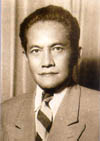
Sunarjo Kolopaking, sometimes spelled as Sunario Kolopaking, was an Indonesian lawyer and sociologist. He was appointed as Minister of Finance in 1945, though rejecting the post, and he later became one of the first Indonesian professors at the University of Indonesia.
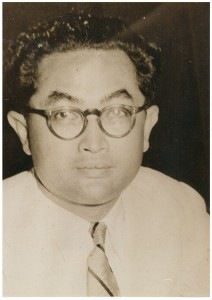
Lukman Hakim was an Indonesian economist and diplomat who served as Minister of Finance between 1948 and 1950, serving under both the Emergency Government of the Republic of Indonesia and the Republic of Indonesia during the United States of Indonesia period. He was also the Governor of Bank Indonesia between 1958–1959, and the Ambassador to West Germany between 1961 and he dead in 1966.

Darmawan Mangunkusumo was an Indonesian economist and engineer who served as the Minister of Welfare between 1945 and 1946, within the First and Second Sjahrir Cabinets. Before his ministerial tenure, he worked as a government economic official in the Dutch and Japanese colonial governments, and was part of the Indonesian nationalist movement since his studies in the Netherlands through Perhimpoenan Indonesia.
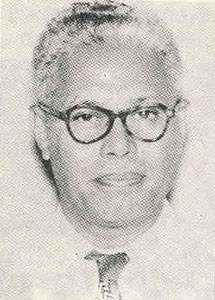
Martinus Putuhena was an Indonesian engineer and politician. He was the Minister of Public Works under Sutan Sjahrir during the Indonesian National Revolution, and briefly served as the Prime Minister for the State of East Indonesia prior to its dissolution.

Raden Mas Margono Djojohadikusumo was an Indonesian politician and banker. He was the founder and the first president of Bank Negara Indonesia, and was also a member of the Investigating Committee for Preparatory Work for Independence.
